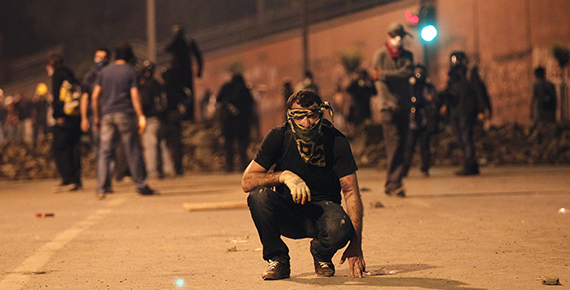Tens of thousands of people have joined protests that began as a civic response to the Justice and Development Party government’s urban reconstruction plans in Taksim, Istanbul’s largest public square. What started as a small group of local activists has evolved into one of the largest public protests in the Republic’s history. Having primarily attracted middle-class urbanites, the protest movement represents a reaction to perceived restrictions on personal rights and liberties. Despite its broad appeal, however, this amorphous coalition of concerned citizens and others failed to produce a coherent political agenda. As such, the Erdogan administration has now a historic opportunity to initiate efforts toward bolstering Turkey’s liberal democratic credentials.
Before moving onto a discussion of what the Gezi Park protests mean for the JDP, it is necessary to raise certain points in the face of efforts to brand the protests as a Turkish Spring. There are various differences between Istanbul’s Taksim protests and the Egyptian revolution that do not undermine the central role that the movement may play in building a better country. First of all, we must establish that unlike the Arab Spring, the great majority of protestors constitute a privileged class who demand greater representation in decision-making processes as opposed to overthrowing the government. Furthermore, Turkey –unlike pre-revolutionary Arab world- has strongly institutionalized electoral mechanisms where voter turnout regularly exceeds 90 percent. As such, the Gezi Park protests must be viewed as a fertile ground to build a liberal democracy. This ambitious project requires institutional arrangements –a country where police brutality will be adequately investigated, the right to assembly will be freely exercised and the now-disillusioned voters will have their voices heard.
To a great extent, the Justice and Development Party’s ongoing popularity and legacy lie at the heart of the protest movement’s universally acceptable demands. Ever since its rise to power over a decade ago, the JDP has worked to dismantle traditional mechanisms that restricted the power of elected representatives. During its first term in power, the party employed the European Union accession agenda to bolster legislative and executive power at the expense of the country’s military. Following the 2007 presidential crisis and the people’s increased support for the party in early elections, efforts to curb military power over parliamentary politics took the form of various reforms and trials. Finally, the 2010 constitutional referendum effectively restricted the high judiciary’s influence over public policy. The Erdogan administration’s continued efforts to dismantle Turkey’s authoritarian regime received continuous support from voters: In June 2011, the Justice and Development Party nearly captured the majority vote and –exceptions notwithstanding- the government’s approval rate remained steady at over 50 percent. (Hence the administration’s consistent emphasis on the ballot box as the sole means of attaining power.)
While the gradual empowerment of parliamentary politics through legislative and sructural military changes received positive feedback from the majority, many opponents felt underrepresented at the national level and disempowered in social and economic terms. Furthermore, the parliamentary opposition –due to poor performance as well as on structural grounds- failed to address their demands for a more open society. This lack of adequate means of representation was most severely felt on controversial issues such as presidentialism and the 2013 peace process. As such, the Erdogan administration’s most recent attempts to impose temporal and spatial restrictions on the sale of alcohol as well as plans to unilaterally design public spaces to whom the aforementioned, disillusioned social class attributed symbolic value served as a tipping point. A









